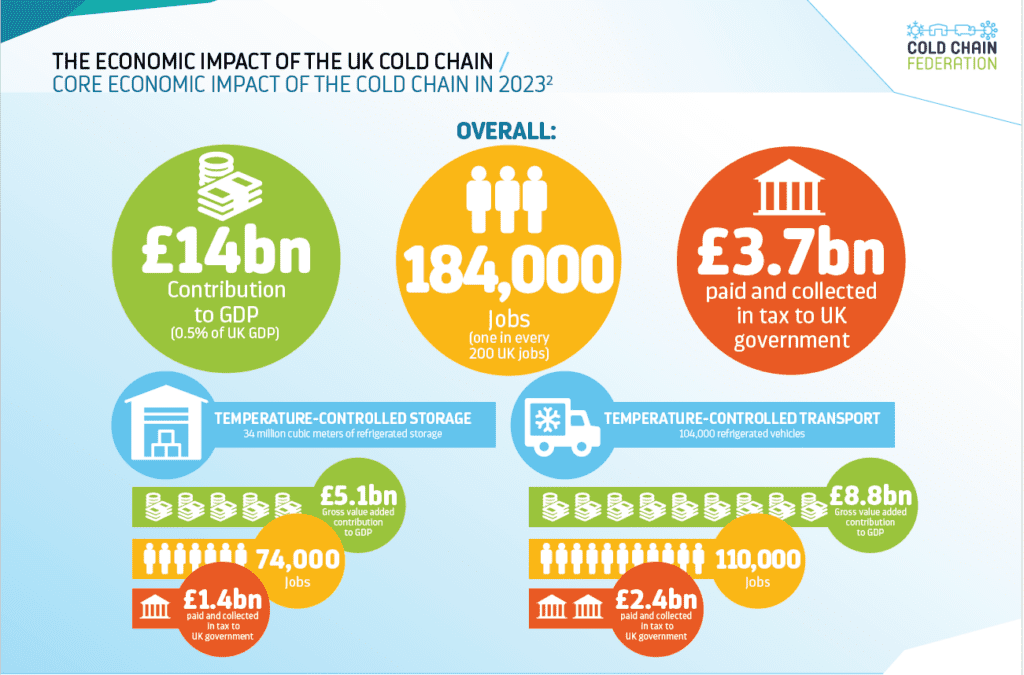Reading, UK: The UK’s cold chain industry adds £14bn to UK GDP, supports 184,000 jobs and provides £3.7bn in tax revenue, according to a new report by Oxford Economics.
But rising energy costs, up 46% in 2023 compared to 2022, weigh heavily on the sector despite over a quarter of cold stores running on renewable energy.
The report, Cold Chain Report 2024, launched at the federation’s Cold Chain Live! event this week, updates statistics on cold storage and temperature-controlled distribution.
The cold chain supports economic activity across all regions of the UK due to the geographically widespread nature of the sector. Jobs supported by the cold chain were concentrated in the East Midlands (23,000), East of England (22,000), North West (21,000).
The report identifies little change in maritime trade use of refrigerated shipping containers. Last year, 342,425 were imported into UK ports, which was no change from 2022. London Gateway is the busiest port, with 51% of all traffic. The sector saw a 9% decrease in exports.
Other key numbers include:
- The number of cold stores operating blast freezers increased by 3% in 2023, when compared to 2022
- The use of CO2 as a primary refrigerant in cold stores increased by 4%, whilst ammonia and HFCs each reduced by 2%
- The cost of diesel used in truck and fridges increased by 4% in 2023
The report highlights the cold chain’s vital role supporting UK manufacturing, facilitating £53bn in chilled and frozen food, beverages, and pharmaceutical sales in 2023.
International trade supporting £12bn in UK exports and £32bn in frozen and chilled goods imports.
Regional economies driving economic activity across all regions with significant job concentrations in the East Midlands, East of England, North West, and Yorkshire and the Humber.
The report reveals that nearly half (49%) of all food and beverages produced in the UK – valued at £50bn – require chilling or freezing. This underscores the importance of the cold chain for sectors like food and beverage processing and pharmaceuticals.
The study also highlights the crucial role of the cold chain in the UK’s horticultural sector. Since all horticultural products require temperature-controlled storage and transportation, the cold chain contributes to the production of £1.7bn worth of ornamental plants in 2023.
Prof Toby Peters, professor of cold economy, University of Birmingham, said: “The cold chain has a critical role to play in a future sustainable and prosperous UK and this Report helps shines a light on the criticality of supporting cold chain development and will help ensure the sector finally gets the recognition it deserves.
“The landscape in which the UK’s cold chain operates has undergone profound change in recent years. In the face of a multitude of pressures from external factors such as rapidly changing consumer demands and trade flows following Brexit, the industry is also adapting to a changing climate and the need to be sustainable. There are promising signs of progress but much more still to be achieved.”
Tom Southall, deputy chief executive, Cold Chain Federation, said: “The Cold Chain Report 2024 unequivocally demonstrates the cold chain’s status as a cornerstone of the UK economy, from supporting millions of jobs to facilitating billions in trade, this sector is a vital engine of growth. We urge policymakers and industry leaders to recognise the cold chain’s immense potential and invest in its continued development.”

